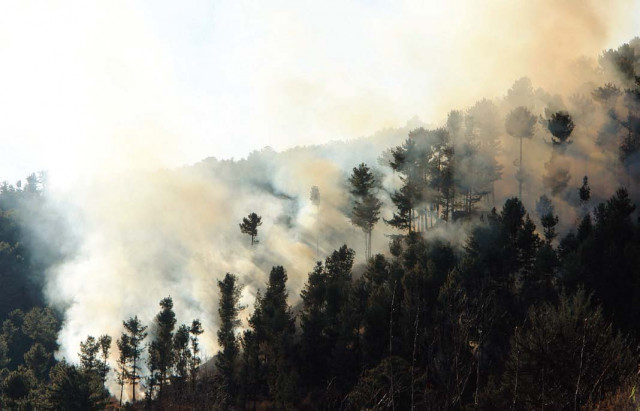Clouds of smoke
Dawn was a magnificent rose pink and gold affair highlighting the jagged teeth of Dur Khaima...

Peaks to hang dreams on, Dur Khaima draws my eyes every time I open the front door: at times overwhelming in its startling clarity, at times floating in a haze of other worldliness and, at times rubbed out by mist and clouds or, as will happen any day now, obscured by a poisonous, brownish haze of pollution known as the ‘Asian Brown Cloud’ which gives me the collywobbles!
This monstrous cloud, the stuff of every environmentalist’s nightmares, is composed of noxious fumes from a million belching factories in densely populated India, of traffic fumes, of the general emissions of modern life along with, some scientists would have us believe, smoke from the cooking fires of the poor: it oozes nastily in our direction from late autumn to early winter, blanketing the plains of the Punjab northwards from Lahore and, at its height, reduces visibility to almost zero, disrupts airport schedules, motorway transport, brings on asthma attacks, reduces sunlight and lowers temperatures to the point of interfering with traditional agricultural patterns.
As if this inescapable invasion wasn’t enough, the crisply dry days of autumn wake up the pyromanical urge of the local population. Over the years I’ve noticed an increasing number of likeminded criminals striking matches all across the deep Jhelum valley in Azad Kashmir. This year they started early.
No sooner had the few remaining animal keepers finished harvesting dry, nutritionless grass for winter fodder and hauled it home to store, than the first clouds of smoke spiraled skywards from the Screech Owl’s neglected land. The Screech Owl, by the way, is a woman with the loudest, shrillest voice imaginable and a pack of children who echo her every decibel…the result is piercing in the extreme and the silence when they depart down to Barakao for the winter season is beatific. Their spring migration back up to the mountain is not exactly the highlight of that season!
As the Screech Owl’s offspring raced around tossing lighted matches in patches of dried undergrowth while she supervised from the upstairs window of her home, the smoke drifted down tickling the noses of fellow pyromaniacs in the valley and, before you could shout ‘No’, they leapt straight on to the burning bandwagon and the sky began to rain down ash. This frenzied destruction of the environment will continue until either heavy rain or snow dampens it down. During the process property may be damaged; adults and children may acquire burn holes in their clothes along with a singed eyebrow or two; plastic water pipes will, undoubtedly, be melted, along with trailing telephone lines and all participants will have, what they consider to be, a whale of a time. I will have a sore throat from pleading, uselessly, with them to desist from this criminal practice.
Entire mountainsides go up in hungry flames each year, acres of forest are massacred, wild plants destroyed, wild animals and birds displaced, streams from which drinking water is collected are choked with black ash and half-devoured pine cones yet the pyromaniacs insist they are doing what must be done to create a greener world next year.
Their lunacy, for that is exactly what it is, is based on pre-Partition hearsay: prior to the birth of Pakistan this particular part of the country was basically Sikh territory and it was they who painstakingly carved out workable terraces all around bare hillsides adjacent to and below forested areas. These people tilled the land, grew crops of barley, wheat, millet, raised livestock and after harvesting burnt the stubble before ploughing it back in to the earth as high potash fertilizer. They also undertook a certain amount of tightly controlled burning of invasive, none forage undergrowth in order to maintain a reasonable amount of decent grazing land for their animals. I am told that these skilled agriculturalists fled east at partition leaving their land and homesteads behind and a corresponding wave of people opting for life in Pakistan trekked west and took over the farms they found here. But, not having an agricultural background, they hadn’t much idea how to go about tending the land. Obviously not every indigenous person migrated east from here, a handful did stay on and it is highly probable that the burning tradition, in a much altered form, was disseminated by them either in a mistakenly or maliciously twisted format. Hence the pyromaniacs of today who merrily torch everything in sight. No one, to the best of my knowledge, still cultivates grain.
Olive Oil of the stinky buffalo feverishly, assisted by Hitler’s wife, sets fire to vast swathes of land that she doesn’t own and I’m not exactly sure who does, every autumn and each spring bemoans the fact that no decent grass grows back quite refusing, despite repeated explanations and demonstrations, to understand that the ‘good’ grass she so desires is shallow rooted and burnt out of existence by the runaway flames whilst the ‘bad’ tall, tough, nutrient poor grass is deep rooted, gets a boost from the fire ash thus grows back and spreads stronger than ever. Olive Oil at least has the excuse of grazing, the majority of the others don’t even own a goat let alone a cow or buffalo and simply set fire to everything for whatever pyromanical thrill they get.
Fires in the actual forest though are for another reason altogether. Legally purchased fuel wood has been soaring in price at an astronomical rate for the last few years: 12 years ago firewood cost Rs35 per maund (a maund being 40 kg), last year it was Rs190 and this year it is a staggering Rs350-Rs420 per maund depending on quality. Therefore it is hardly surprising that stealing forest trees for firewood is on the rise and, in an attempt at hiding the evidence, the perpetrators set fire to the crime scene hoping to cover their tracks. A very limited amount of government-subsidised firewood is sold at designated places by the side of the main road and it is in the form of entire tree trunks which nobody can move without laboriously and expensively chopping up first. Then, it still has to be transported or physically carried to settlements away from the road. Needless to say both labour and transport are expensive with day labour currently demanding Rs400 plus tea, lunch and more tea. So stealing convenient forest trees is a much more affordable prospect!
The way things are going, the population expanding rapidly, houses shooting up all over the place and cash money becoming as scarce as hen’s teeth, it won’t be too many years down the line before the remaining forests have gone up in smoke one way or another and the price of that will be brutal for us all.
Published in The Express Tribune, November 14th, 2010.



















COMMENTS
Comments are moderated and generally will be posted if they are on-topic and not abusive.
For more information, please see our Comments FAQ